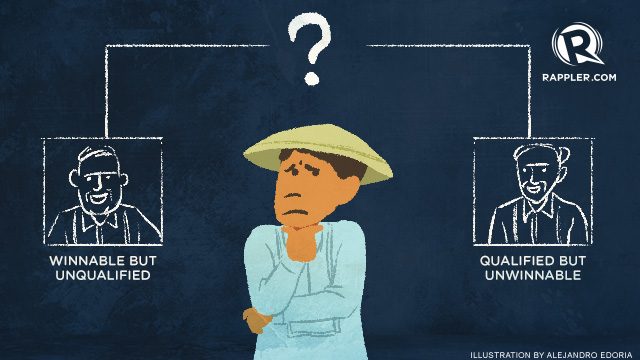SUMMARY
This is AI generated summarization, which may have errors. For context, always refer to the full article.
 We begin with a disclaimer: this is not to endorse any particular candidate. This is an analysis of the coming presidential elections as gleaned from past experience and grounded on reality.
We begin with a disclaimer: this is not to endorse any particular candidate. This is an analysis of the coming presidential elections as gleaned from past experience and grounded on reality.
While it is still early, the truth of the matter is the race has begun. Like any sporting event, this stage can be considered the qualifying rounds of the 2016 presidential race. Mass media advertising has started for many candidate wannabes. Though the ads don’t ask citizens for their votes, they flaunt their so-called achievements and pour upon us their qualifications.
These political exercises have become the great national pastime. We love to discuss what’s going on, from the single chair barbershop at the far end of shanty town to the posh coffee shop of the 5-star hotel at some central business district. The language is the same – we praise our manok (bet) to high heavens and curse his closest nemesis (real or perceived) in a language common to the MRT commuting public and polite society.
Realities
But there are a couple of things we know deep down in our hearts yet somehow refuse to accept as reality when it comes to our electoral exercises. And these two things make all the difference in elections, whether strategizing and running campaigns or voting for our top leader.
First, that voters – all voters – do not want to vote for a loser. That is, a perceived loser. That’s why prior surveys and polls are key to our pre-election life because, like a horse race dividendazo (racing form) these surveys give us a tangible guide of a possible winner.
To the ordinary person, voting for a possible loser means wasting a vote. Many times we’ve heard: “Why will I WASTE my vote on that guy, he’s a sure loser anyway?” That, of course, runs counter to the very essence of a true and working democracy where we are supposed to vote for who we truly believe is qualified for the job. But no, we vote for a winner.
Even the so-called bought votes that are controlled by the local politicians spread out all over the country are ultimately set aside and commanded to cast their lot for the perceived winner. A local leader worth his mettle will not use up his political resources and capital behind a loser for it will mean sure death for his own career and power if it is known he supported a loser. Great favor will be granted by the victor when the local politician is credited delivering victory in his territory.
Second, we tend to overlook the reality that we are limited to voting for those who are fielded during elections. Come election day we don’t have much of a choice except cast our vote for whoever is officially running – even if the list reveals that they are the lowest of the low.
Boycotting an election because we have nothing good to choose from is not an option. By doing so you give up your franchise and give a big chance to the worse of the lot rather than the best, no matter how bad a choice we feel it is. Remember, our election system dictates that the winner is the candidate that gets the most number of votes against each opponent. If in a worse case scenario all voters boycott except one person, the winner will be that candidate who gets that one vote, regardless of the 10 million or so voters who boycotted the elections.
Making a choice
How does this apply to the current presidential race? Well, if we are to take our right and duty in suffrage seriously, we have to vote who we feel is best qualified regardless of winnability, and find that candidate from the limited list given to us.

For example in the 2016 race we have – based on their pronouncements in the news, or hints, or even convoluted body language – Jojo Binay, Grace Poe, Rudy Duterte, Bongbong Marcos, Ping Lacson, Dick Gordon, Antonio Trillanes, Alan Peter Cayetano, and Mar Roxas. The committed followers (groupies?) of these guys have already cast their lot. But the undecideds – the general public – are thinking at this point: That’s it? Can’t we have something better?
Come official campaign period we have to squarely face reality: that’s it. No all-of-the-above, no none-of-the-above.
So voters have to analyze each one, in terms of qualifications and, most importantly, in terms of issues against the candidate:
Binay: corruption. Not just corruption, but corruption in the highest, most despicable levels. We’ve had experienced political leadership like that in the past, so experienced that they pillaged the national coffers. This is nothing new.
Poe: risking another lack of experience and proven track record; all heart but possibly no capacity to lead. Another been-there-done-that, and it did not exactly lead us to greatness but just pandered to the oligarchy.
Lacson: while his claim to “inspired” leadership may have had concrete results, very serious allegations in cases involving murder and narco-politics haunt him mainly because they remain unresolved. And he was on the lam for an extended period, a fugitive who, to this day, has not answered for hiding from the law even while he was a senator duty-bound to uphold it.
Marcos: his past is his greatest obstacle. While he has maintained that he is his own man, with his own sterling qualifications, he has not denied and continues to uphold the legacy of his father and the rest of his family. History’s judgement is clear on that, and he cannot rewrite that no matter how hard he tries.
Duterte and Gordon: their parochial style of governance, no matter how attractive and quick acting it may be, will not work in the highest office of the land where delegation of duties to a national network and bureaucracy, diplomacy and statesmanship is much required.
Trillanes and Cayetano: with all their efforts to expose anomalies, especially of Vice President Binay, why aren’t they being hailed as heroes? Because of their method in doing so. Not presidentiable at all. In fact, the word the public is using is “bastos (rude).”
Roxas: despite his extensive governance experience, lack of any proven heavy corruption allegations, the education and pedigree, he fails to connect with the masses. Often times he tries so hard it looks comical. Plus his cautious approach makes him look indecisive, trapped in the vortex of analysis-paralysis. But he studies and learns and it seems that any weakness in this area is no mortal sin and can be overcome with diligence. Mass appeal and street smarts, however, will take a little more effort.
So, given all that, who should voters choose? The perceived winnable but unqualified candidate? Or the qualified but perceived (this early) as unwinnable?
From the current survey numbers, Binay is the top winnable but as of late Poe is not far behind.
And in this field of choices – a very limited field – who stands out as the best? You could say that in a field of bad choices, Roxas may be the best bad choice we have.
That’s the way our election system works. – Rappler.com
JP Fenix: 53 years on earth, 32 years communications professional, 28 years print journalist, 10 years broadcast journalist, 8 years born again Christian, 7 years full time dad, 53 years AD/HD.
Add a comment
How does this make you feel?
There are no comments yet. Add your comment to start the conversation.